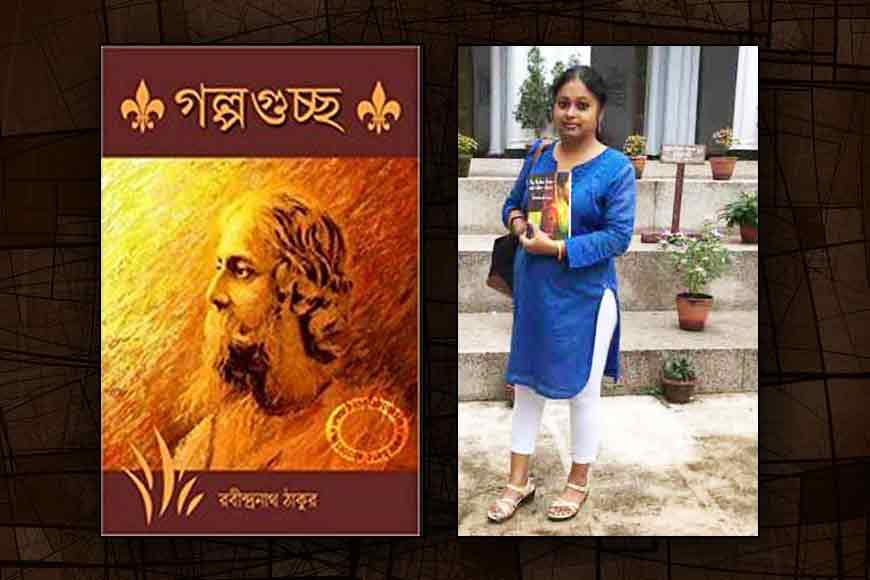Read translation of Rabindranath Tagore’s short story Tyaag

Chapter 1
It was the month of Falgun in Bengal, a full moon night seeped in the essence of mango blossoms, the gentle breeze of the nascent spring swayed seductively. A sleepless singing bird was creating its mellifluous melodies that pierced the dense leaves of the old lychee tree at the bank of the ancient pond,and wafted in the sleepless bedroom of the Mukherjee’s. Hemanta, a restless young man was segregating strands of delicate hair from the meticulously woven bun of his wife, tangling the hairs in his fingers. A minute later, he was making a sweet, tinkling sound with her bangles. Again, he was flirting with the garland of flowers she had worn in her hair, pulling it from its place, bringing it over her face. A fervent lover, he was like the gusty wind, in a desperate bid to awaken, animate the lifeless flower plant, oscillating vigorously around it, playing with it with all his might.
But his wife, Kusum remained still, fixing her ardent gaze in the vast, boundless space hovering above her, bathed in the sweet splendor of the moon. The restlessness of her husband touched her for a brief moment or two, but failed to create a lasting impact on her stance. Finally, her husband Hemanta took her hands and moved them impatiently.
Hemanta: “Kusum, where are you? You feel so distant from me; so distant that I feel I would have to get a huge binocular and look wide and far for you, yet get only a tiny glimpse of you. I wish you come closer to me today, Kusum. Look at the mesmerizing beauty of the night around us, just look!” He said to her.
At this, Kusum lifted her face away from the vacant space and looked at her husband’s eager face.
Kusum: “This full moon night, the vigor of spring can obliterate like a false dream at this very moment. I know of a secret mantra that can wipe away all of this.” She said.
Hemanta: “Oh, is it? However, even if you know that, do not spell that right now. Instead, if you know of a mantra that can make three-four Sundays in an entire week, or can stretch this night till 5 or 5.30, which means tomorrow evening, I am ready to hear that.”
He moved away a bit closer to her, and tried to pull her towards him. Kusum, on her part, evaded his embrace with all her might.
Kusum: “I had planned to say something to you in my death-bed. I wish to say that to you tonight, at this very moment. Tonight, I feel I can bear the burden of all the punishment and censure you want to heap on me.”
Hearing this, Hemanta uttered a sloka by Jaydev about punishment, attempting to add a tinge of humor to counter the somber stillness of his wife. But at that very moment, he was startled to hear the angry sounds of his father Harihar Mukherjee’s familiar shoes, crunching the stillness around. He sprung up, overtly conscious of the footsteps.
Harihar crept closer to their bedroom door and roared with wrath. “Hemanta, order your wife to go away from our house, at once!”
Hemanta looked at his wife’s face with astonishment, but her countenance remained unperturbed. She sat in her place, cupping her face with her two hands, as if trying to wipe herself away from the world with all the will and courage that she could muster. The southern breeze blew incessantly, the melodies of the singing bird ‘papia’ mingled with it and entered the room like an uninvited guest. Nobody in the room welcomed it, or paid any attention to it, reminding the old truth that in spite of all the beauty and magnificence of this earth, all of it turns useless sometimes.
Also Read
TALE OF THE MISSING BENARASI SAREE
Chapter 2
Hemanta came back to the bedroom and asked his wife: “Is it all true, Kusum?”
Kusum: “Yes, true.”
Hemanta: “Why didn’t you tell me then, all along?”
Kusum: “I have tried to, many times, but couldn’t. I am a great sinner, I know that.” < /p>
Hemanta: “Then tell me all about it, just now.”
Thereafter, Kusum narrated everything in a somber tone, with steely determination. She seemed to walk through a ravaging fire with slow, steadfast steps, but nobody knew how much she was charred. Hemanta left the room, right after listening to the entire story from her.
Kusum had realized that once her husband would go away, he would desert her forever. However, that did not amaze her; just like the daily paraphernalia around her, it appeared before her with natural ease. With her numb, parched heart, she looked at the world unfolding around her, the essence of love which appeared to her like a huge lie, a void never to be filled. Even when she reminded herself of her husband Hemanta’s love and devotion for her, a cold, crooked bout of laughter pierced her heart like a sharp, cruel knife, leaving an imperishable scar. The love of her husband which had such a mammoth place in her heart, the love which had eclipsed her being with its profundity, the pangs of separation from him, which had been so heart-wrenching, the momentary embrace of the love that had made her so ecstatic, the love which seemed so boundless and eternal, whose closure was so unimaginable to her in a thousand births, seemed utterly vain at this very moment.
“Such fragile, such a falsity!” She thought. A momentary onslaught of the hard, censuring reality of the society is capable of grinding this boundless love into dust, leaving it in a void of nothingness.
She could still feel the trembling voice of Hemanta, whispering into her ears: “Such a mesmerizing night it is, Kusum!”
The night was still around them, indolent and young, the singing bird ‘papia’ still churning its endless melodies, the southern breeze still swaying the mosquito net. The moonlight fell over the bed adjacent to the window, like a shy, demure bride, overwhelmed with pleasure.
All of it is vain… love, you are even more false and treacherous than myself!” She murmured









